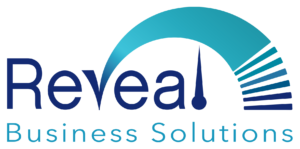Two, Four, Six, Eight – Business Apps Should Integrate!
By: Valerie Briley, CPA, Founder & Chief Business Driver, Reveal Business Solutions
When I work with business owners to help them get a handle on their finances, I start by explaining how having good accounting processes in place will help them increase profitability. Next, I tell them about one of our secret weapons for implementing good accounting processes – integrated apps.
What Are Integrated Apps?
“App” is short for application, which is a type of software that allows you to perform a specific task. If you have a computer or smartphone, you’re using apps all the time. Some of the most common are household names like Microsoft Word, iTunes, Google Chrome, or WhatsApp. A whole range of apps have been developed for use in business. These apps streamline operations, solve specific problems, and are often industry specific. A well-designed app can transform a difficult task into one that’s a breeze. Apps can save time, eliminate errors, and deliver insights.
When apps work together, they’re integrated. Imagine all your software being able to talk to each other and share information. With Integrated apps you reduce data repetition and redundancy, and your business and work procedures can be automated and performed proficiently.
There are business apps tailored for every industry, business function, and department. By using software tools that can be integrated, it’s possible to implement large-scale business process automation, which leads to tremendous gains in efficiency and generates more accurate data for financial reporting. It’s a beautiful thing.
QuickBooks Online Allows for Integration
To help our clients get the full benefit from their integrated apps, we use QuickBooks Online (QBO) as our accounting platform. QBO is different from QuickBooks Desktop because it has something called an “open API.” Without getting too technical, open API makes it possible for app designers to connect their app with QBO. For example, the payroll app we use integrates with QBO, so every time payroll processes, it automatically books a journal entry into the accounting software to record the payroll, taxes, etc. This saves a lot of time and reduces the chance for error, because the accounting team does not have to create and record a journal entry to account for payroll costs.
Here’s another example. One of our clients owns a landscaping company and he uses a point of sales app that was designed specifically for landscaping. It creates estimates, schedules the work crew, collects payments from customers. Their entire team works from this robust app designed specifically for landscaping businesses. But the magic happens behind the scenes because the app also integrates with QBO, so any information that’s relevant to business finances automatically transfers to the accounting software in real time. Sales invoices are synced and mapped to revenue, time can be job costed, payments can be applied to invoices and deposited.
Integrating Apps Modernizes Accounting
App technology brings accounting into the modern age. No more pushing pencils or recording tons of manual transactions. Ledgers are out, the iCloud is in. Integrated apps allow you to take advantage of best-in-class software solutions that are easy to use and were designed to help you run your business more smoothly. Together, those apps create an eco-system of software that extracts the financial information necessary to provide you with timely actionable data so you can make informed decisions. By integrating apps and working in the cloud, your business can grow exponentially faster, profitably.
If you would like to learn more about how integrated apps can transform your financial data, schedule a discovery call with our team at Reveal Business Solutions. We partner with business owners around the country to help you drive your business forward!
